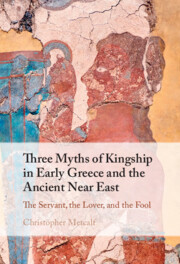 Three Myths of Kingship in Early Greece and the Ancient Near East
Three Myths of Kingship in Early Greece and the Ancient Near East Published online by Cambridge University Press: 19 December 2024
Although kings are often central to the extant literary (and other textual) evidence from Mesopotamia, the wider Near East and the eastern Mediterranean, the texts themselves were usually authored by others, such as poets, priests, prophets or scholars. If mortal kings typically claimed to rule thanks to divine support, these latter characters similarly tended to base their authority on their ability to articulate and enact the divine will. Inevitably perhaps, the stage was set for narratives of conflict between kings and other intermediaries of the divine. This chapter shows that the ancient sources again exhibit a consistent pattern: it is always the king who initiates the conflict, often in a military context. The king is not necessarily impious, but shows casual disregard for the divine will, despite the information offered by a reliable intermediary. This is invariably depicted as an act of folly. The negative consequences soon become apparent, but they are usually borne primarily by the people whom the king was supposed to lead. The first attestations are found in Sumerian sources from early Mesopotamia. The other main bodies of evidence are the Hebrew Bible and the early Greek epics of Homer and Hesiod.
To save this book to your Kindle, first ensure [email protected] is added to your Approved Personal Document E-mail List under your Personal Document Settings on the Manage Your Content and Devices page of your Amazon account. Then enter the ‘name’ part of your Kindle email address below. Find out more about saving to your Kindle.
Note you can select to save to either the @free.kindle.com or @kindle.com variations. ‘@free.kindle.com’ emails are free but can only be saved to your device when it is connected to wi-fi. ‘@kindle.com’ emails can be delivered even when you are not connected to wi-fi, but note that service fees apply.
Find out more about the Kindle Personal Document Service.
To save content items to your account, please confirm that you agree to abide by our usage policies. If this is the first time you use this feature, you will be asked to authorise Cambridge Core to connect with your account. Find out more about saving content to Dropbox.
To save content items to your account, please confirm that you agree to abide by our usage policies. If this is the first time you use this feature, you will be asked to authorise Cambridge Core to connect with your account. Find out more about saving content to Google Drive.